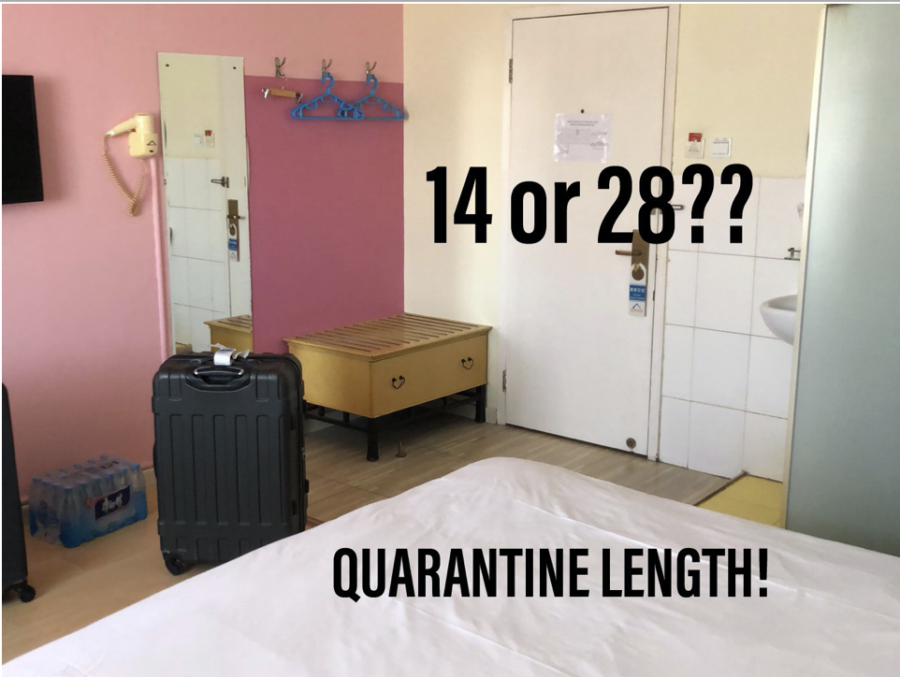Arguably the best country fighting against Covid-19 in this global pandemic, China, is frustrating its own citizens with its over-the-top quarantine policies even though there have been almost no local cases for months.
With local or community spread out of the way, China’s biggest threat shifted to imported cases from overseas. On a seven-day average in late March, the number sits at 12 imported cases per day. Compared to China’s 0 domestic cases for weeks, dozens of imported cases may still seem like a lot. However, roughly a year ago on March 20th, 2020, a day after China’s recorded 0 local transmitted cases for the first time since the start of the pandemic, the number of imported cases was 39 with just 14 days of mandatory quarantine.
Even though the number seemed like a threat to China’s overall battle against the virus, it’s crucial to notice that all of the imported cases are under strict “closed loop management” according to China’s policy; from the second a returnee boards to plane, to their 14th day after the start of their quarantine, they are completely isolated from the society. The only people that will be in contact with them are their fellow passengers, who are also going into this closed loop, and airport and hotel workers, who are in full protective gear, hazmat suits, if you will.
According to China’s top epidemiologist, Dr. Nanshan, Zhong, the average incubation period of Covid-19 is 14 days, which determined the length of quarantine in China and most of the countries in the world. Covid-19 is known to be one of the sneakiest viruses we have ever encountered. According to the Chinese Centers of Disease Control and Prevention (CDC), 11 people tested positive after they were cleared from their 14-day quarantine since October, 2020. Among these 11 positive tests 6 people tested positive within a week after their clearance.
Without a doubt that these unexpected positive tests impose threats to China’s “hard-fought and won victory” as the state media claimed, yet it is not a reasonable decision to extend the length of quarantine to 21 days, 28 days, or even in certain areas, 42 days.
While certain cities are still coping with the science-backed, reasonable 14-day quarantine, other places have decided to make it harder for their own people to come home by brutally adding on arbitrary amounts of time.
Take Zhejiang province as an example. The official quarantine length was changed from 14, to 14+7+7 on January 26th. After 14 days of mandatory quarantine in a specified hotel, travelers were forced to choose between a mandatory stay-at-home quarantine, or a continuation of hotel quarantines.
As encouraging as a stay-at-home quarantine sounds, the choice is indeed not in people’s hands but is up to local officials. China categorizes different neighborhoods into “streets”, meaning that one department will be in charge of all the households living in this “street”, which gives them the power to decide if certain people meet the requirements of an at home quarantine.
However, certain people may be rejected from a stay-at-home quarantine due to ridiculous requirements such as “The sewage system of the house must be individual, separated from other households in the apartment.” Maybe it would be helpful for certain officials in China to know that not a lot of buildings were designed for quarantines during a once-in-a-century pandemic.
Other places also joined in on this hilarious show of “who has the longest quarantine length” by adding extra, but unnecessary days after the 14-day mandatory quarantine.
Places in the northern part of China, such as Chang Chun, Ji Lin, or Harbin, were some of the frontrunners of this notorious competition.
According to Mr. Meng, who publicly shared his quarantine journey on his social media, RED (China’s Pinterest), his quarantine length was added up to a shocking number of 49 days.
Since there are no direct flights from overseas to his hometown, Jiangxi, he first completed his quarantine in Canton for 14 days. However, with no explanation provided, local government in Jiangxi province stated that they do not take the 14-day mandatory quarantine into consideration, putting him into a hotel room for another 14 days upon his return.
After his mandatory hotel quarantine, another 14 days of stay-at-home quarantine was added with no regards that he has already been quarantined for 28 days, two times the regular incubation period. After 14+14+14, he was forced to “self-monitor” for another week, without the permission to leave his house, only not having to report his daily temperature.
At this point, the formula looks like 14+14+14+7=49. Almost two months, or 13% of the entire year, with no physical freedom or connection with society.
Therefore, even though the central government imposed an effective, much-needed and reasonable 14-day quarantine, local governments raced to add weeks, or even months, after the period fearing responsibilities and pressure from society. With hardly any local cases on a monthly basis, any city, or province will be put under the spotlight once a local case emerges, which therefore brings local government and people pressure. However, it should never be a legit reason to explain the addition to the quarantine length.
Beijing, with the ability to test 746,000+ people in just one day; Xi’an, traced and tested almost 10,000 people just a few hours after an accidental exposure of a laboratory worker, all together with China’s strict review and approve policies of overseas travelers before their departure at local airports, still cannot prevent local authorities in China to create their own quarantine policies just to dodge the responsibilities and potential repercussions.
The message: “No matter where you are, China will always welcome you home.” was sent out by the best-selling movie in China’s history, Wolf Warrior II in 2017. Chinese people, along with the media absolutely loved the message and almost made it a national slogan.
4 years later, with thousands of China’s very own people unfortunately being stuck overseas, fearing xenophobia, worrying about being exposed to the virus and desperately hoping to see their loved ones, China may not be sending out welcoming messages by not only limiting the number of flights, but also imposing extravagant, unnecessary quarantine rules.







![Many Webb students spend their free time in the library watching a popular TV show like Riverdale and Euphoria. “Based off what I’ve seen, like in Euphoria, because the actors are older, they don't showcase an actual high school life properly,” Sochika Ndibe (‘26) said. “Since [the actors] are older [and] playing a teenager, from a girl’s perspective, it is going to make you think you should look more developed at a young age.” The actor, who plays Veronica Lodge, was 22 years old at the time of filming.](https://webbcanyonchronicle.com/wp-content/uploads/2025/03/Antecol-Media-affects-how-society-functions-graphic-1200x900.png)

